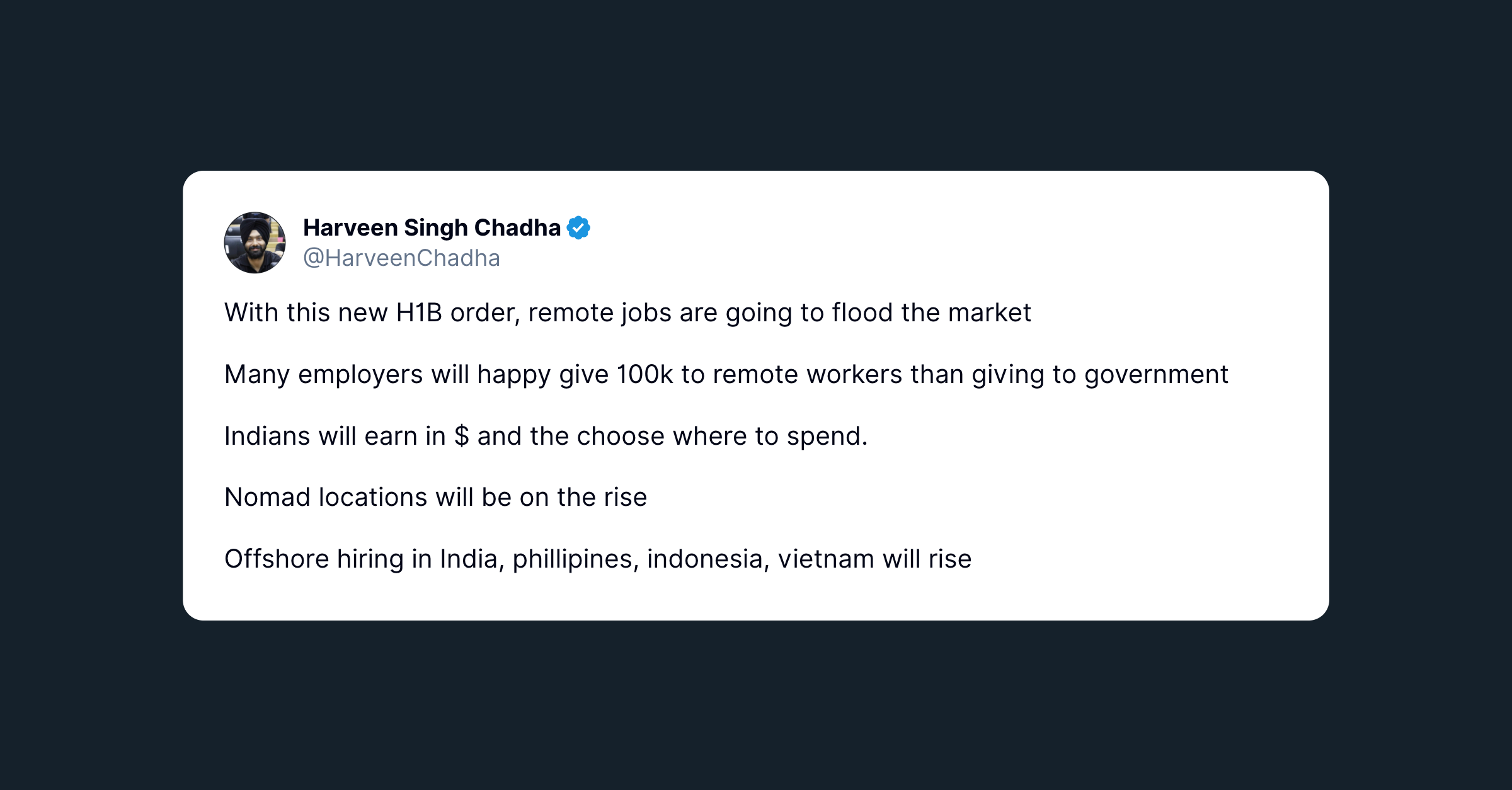H1B Visa Cancellation and what’s in it for Indian talent

Riten Debnath
23 Sep, 2025

Hello friends,
Lately, there’s been a lot of noise about the H1B visa getting tighter or even being cancelled. Whether the policy actually changes a little or a lot, one clear thing is happening: companies are thinking differently about how they hire. I did some research based on the resources and what the experts are suggesting. That's when I came across this tweet as well.
I want to break this down for you in a simple, real way and tell you what it could mean for your career.
Quick reality check
If the H1B route becomes harder, companies will ask a simple question: why spend time and money on visas when they can hire great people remotely? That logic is already pushing remote hiring growth. The H1B change is not a magic switch, but it is an accelerant. More remote roles will open up, and many will look to markets like India.
Wait, there’s also the HIRE Act
Before we get too excited, let’s talk about another new piece of news: the HIRE Act (Halting International Relocation of Employment Act).
Here’s what it says:
- It introduces a 25% tax on “outsourcing payments”.
- That means if a U.S. company pays you remotely from India (or anywhere outside the U.S.), the U.S. government wants a cut.
Sounds scary? Not really.
- Companies may still prefer paying remote workers instead of going through the headache and cost of visas.
- Yes, some of the cost may get passed on to workers (so maybe salaries are a bit lower than expected), but even then, for many Indians, earning in dollars is still a huge step up compared to local pay scales.
- In simple terms: the remote opportunity is still there, but it might just come with slightly different numbers.
So the HIRE Act doesn’t kill the trend. It just means companies and workers will adjust.
The upside for Indian talent
Here’s what’s in it for you:
- More opportunities to earn in dollars and euros: Remote hiring means salaries set by global standards. Even if adjusted, many of these will still be much higher than purely local roles.
- Freedom to live where you want: You could work for an international startup while living in India. Or try nomad-friendly places like Goa, Bali, or Vietnam. Your income stays global, but your lifestyle can stay flexible.
- Bigger market, not just local jobs: You are no longer competing only with people in your city. You are competing globally. That’s tougher, but demand for skilled people will also keep growing.
- New types of roles and projects: Remote work often breaks jobs into projects or contracts. That’s an advantage if you have strong proof of work and can show you deliver results.
The limits to keep in mind
Let me be honest with you. Not everyone is going to suddenly get a $100K remote job. Companies still care about trust, communication, and results. And not every role can be remote.
So treat this as a wave of opportunity, but one where you’ll need to stand out.
What will win you those global roles
Here’s your practical playbook:
- Build proof of work: Real projects > long resumes. Share code, case studies, designs, campaigns, or product work. Show outcomes, not just responsibilities.
- Be visible and consistent: Post your work and learnings on LinkedIn, Twitter, or communities. Let hiring managers discover you.
- Get remote-ready skills: Focus on software, design, data, content, growth, AI, or product. Learn async collaboration tools (Notion, Slack, Loom, Figma).
- Sharpen your communication: Remote teams love people who can write clearly and over-communicate. It’s often as important as your technical skills.
- Price yourself smartly: Know global rates. Don’t undersell just because you’re in India. If you deliver value, charge fairly.
- Use platforms that showcase proof: Fueler and similar platforms are powerful because they let you show your work, not just talk about it.
Fueler Proof of Work Page Template
Here's a format on how you can publish your work online
Title/Project Name: Landing Page Redesign for SaaS Startup
Problem: The startup’s landing page had low conversion (1.2%).
Action Items/Highlights:
- Redesigned UI in Figma
- Improved copywriting with clear CTAs
- Ran quick A/B test with 500 visitors
Result: Conversion improved to 3.8% in 2 weeks.
Link to Work: [Add link to design/code/file/demo]
Skills Used: UI/UX, Figma, Copywriting, A/B Testing
So, where India stands
In my opinion, India is uniquely positioned to take advantage of this shift. Here’s why:
- Sheer scale of talent: Every year, millions of students graduate with technical and professional degrees. While not all are job-ready, the sheer volume gives India a depth that few other countries can match. That means global companies will almost always consider India when they think “remote talent.”
- English and global work culture: Unlike some other outsourcing hubs, India already has a long history of working with U.S. and European companies — from IT services to startups. This familiarity with Western clients, plus strong English fluency, makes Indian talent easier to onboard remotely.
- Cost–value balance: Indian professionals can deliver strong skills at competitive rates compared to the U.S. or Europe. Even with the HIRE Act tax or adjusted salaries, the value equation will still be in India’s favor. For companies, India often represents the “best ROI” market.
- Growing startup and freelancer culture: More Indians are building side projects, freelancing, or working with global startups than ever before. This entrepreneurial energy means you don’t just bring skills — you bring a problem-solving, founder-like mindset that global companies love.
- Communities and platforms rising: From learning communities to platforms like Fueler, Indian talent now has places to showcase proof of work, collaborate, and get discovered. This is a huge shift from the old CV-driven model.
Of course, competition will rise. Countries like the Philippines, Vietnam, and Indonesia are also scaling their talent pools. But India’s combination of numbers, skills, language, and culture gives it a strong edge. If you position yourself right, you won’t just be competing — you’ll be leading.
Where India stands
India is in a strong position here. We have a huge talent pool, English fluency, and a vibrant startup culture. The competition will rise, but the scale of opportunity is big enough.
Final thought
This is not about H1B being good or bad. It is about a shift in how companies access talent. If you prepare now, this change will work for you. If you wait, you will watch others grab the opportunities.
Start building your proof of work today. Make yourself discoverable. Learn to work async and show impact. The world is opening up for remote talent. You can be part of that wave.
Keep building, keep shipping.


